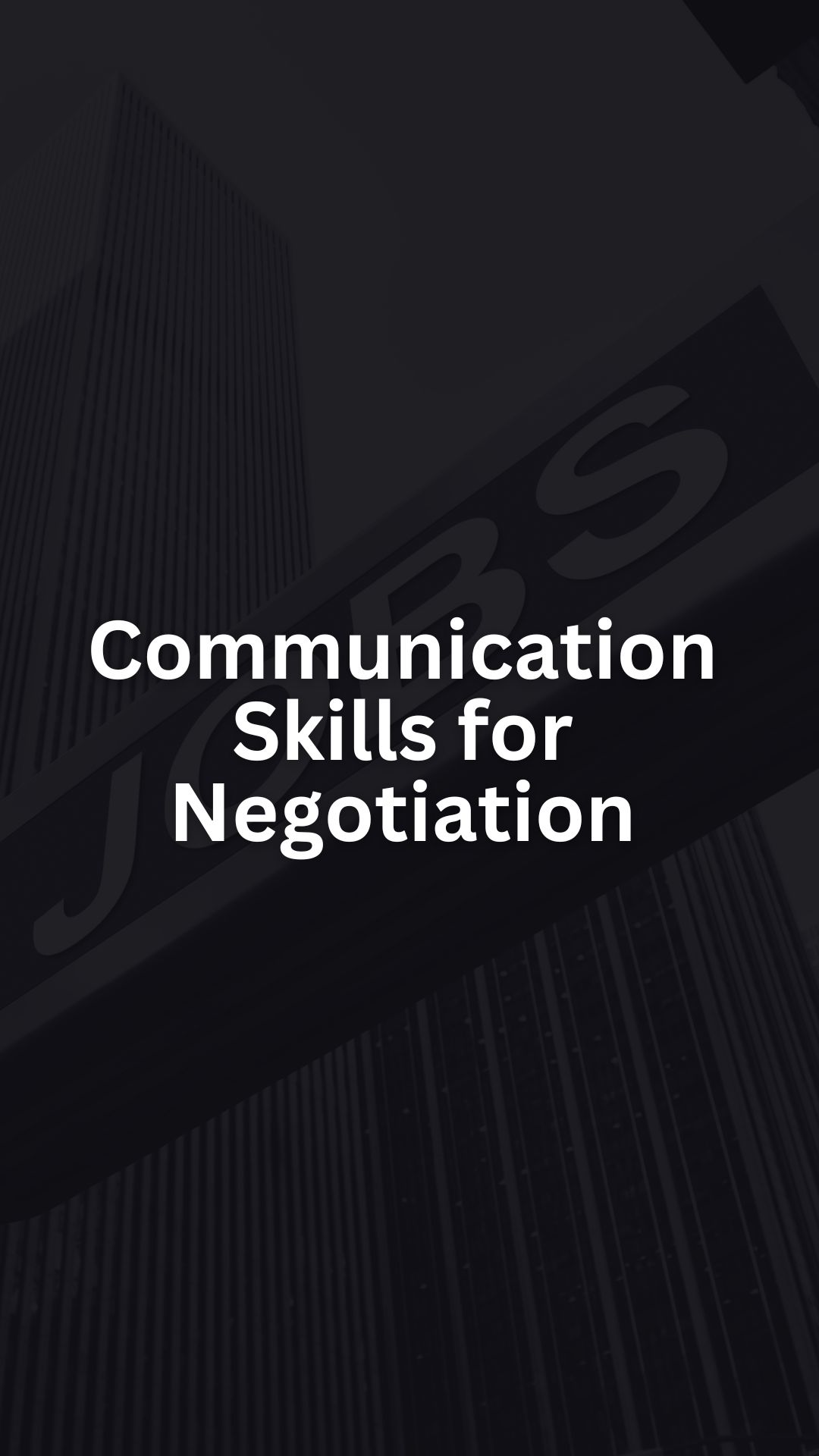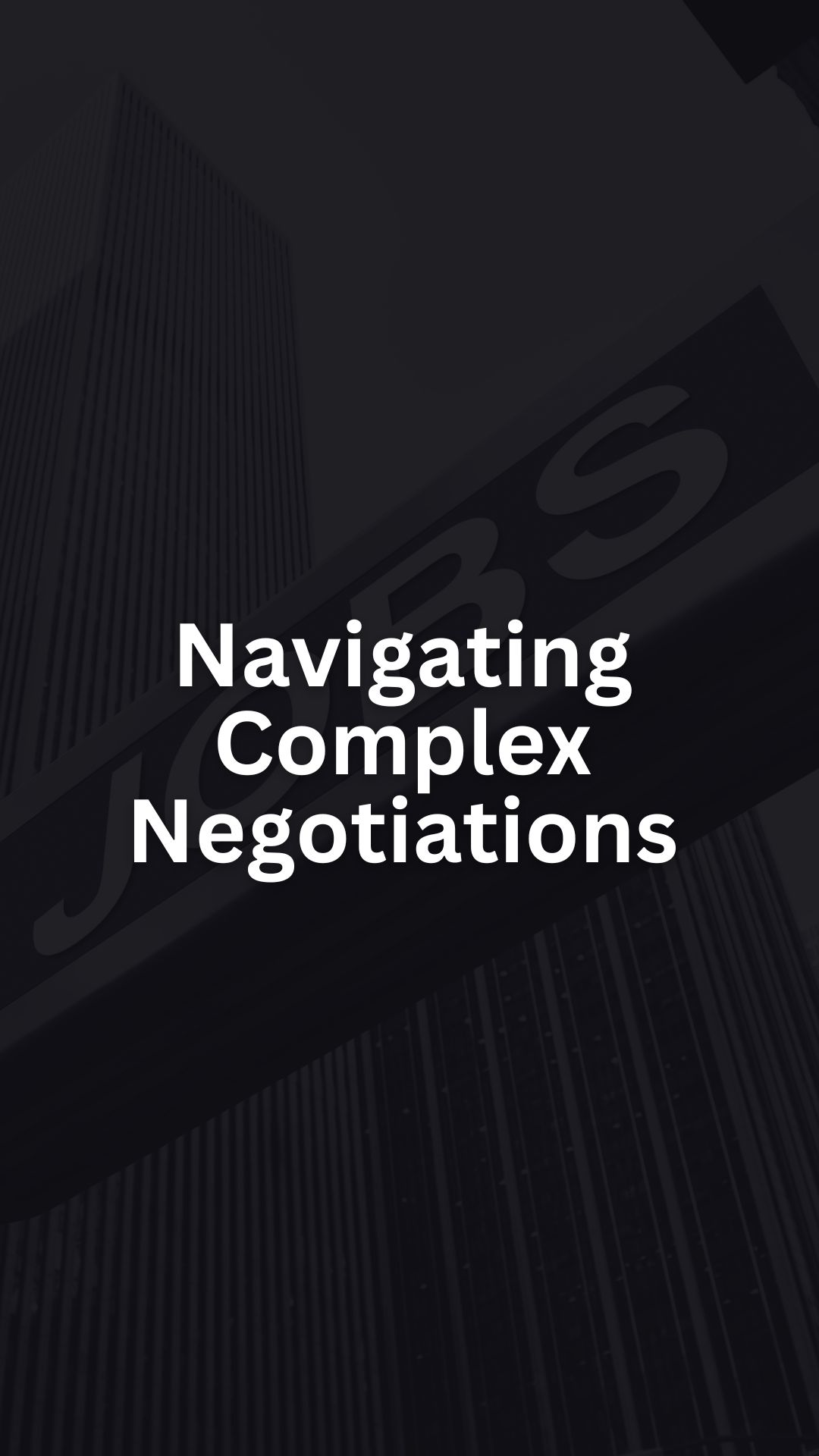Imagine boosting your career by becoming a master at negotiation. It might seem challenging, but once you learn the right techniques, you’ll see how valuable these skills are.
Negotiation isn’t just about getting what you want. It’s also about creating win-win situations where both sides feel satisfied.
Developing strong negotiation skills can open doors to promotions, better deals, and more opportunities.
Whether you’re asking for a raise, negotiating a project, or dealing with clients, being able to negotiate effectively can make a huge difference. You’ll feel more confident, and people will respect your ability to communicate and compromise.
So, how do you start?
Focus on understanding the basics, like active listening and clear communication.
Practice makes perfect, so try these skills out in everyday situations. Soon, you’ll notice improvements not just in your career, but in your personal life too.

Understanding the Fundamentals of Negotiation
Unlocking solid negotiation skills can change your career. You’ll learn the psychology behind negotiations and the key elements needed for success.
The Psychology of Negotiation
You need to know what motivates people. Understanding emotions helps predict reactions.
Emotional intelligence is key. It means being aware of your own feelings and those of others. This awareness can give you an advantage.
Active listening is another must-have skill. When you listen more than you speak, you gain valuable insights. People love to feel heard, and this can build trust. Trust makes negotiating easier.
Also, stay calm under pressure. Stress can cloud your judgment. By staying cool, you can think clearly and make better decisions.
Key Elements of Successful Negotiations
Preparation is the first step. Know what you want and why.
Research is crucial. Gather as much information as you can about the subject and the other party. This knowledge gives you power.
Be clear about your goals. Set SMART goals: Specific, Measurable, Achievable, Relevant, and Time-bound. Knowing your goals helps you stay focused.
Effective communication skills are crucial. Be clear and concise. Avoid jargon that can confuse others. Use simple language to get your point across.
Also, consider the other party’s perspective. Understanding their needs can help you find a win-win solution.
Finally, always have a backup plan. If things don’t go as expected, you’ll need an alternative. Having options allows you to walk away if the deal isn’t right. This confidence can actually improve your bargaining position.
Preparing for Negotiation
Before stepping into a negotiation, it’s crucial to know your goals, gather information, and plan your approach. These steps will help you be more confident and persuasive.
Setting Clear Goals
Determine what you want to achieve. Do you want a higher salary, more vacation days, or a flexible work schedule?
Be specific. Instead of just thinking “more money,” decide how much of a raise you need.
Write your goals down and rank them. This can help you prioritize during the discussion. Also, consider your bottom line—the least you are willing to accept.
- Ask yourself why these goals are important to you.
- Understand how each goal aligns with your career growth.
- Be ready to articulate these points clearly.
Research and Information Gathering
Find out what the norm is for what you’re asking. Research industry standards for salary, benefits, and job roles. Use websites, surveys, and networks to gather data.
Know the company’s background. Look into their financial health, recent news, and business goals. This information can show you where they might have more flexibility.
- Gather data before the negotiation.
- Use reliable sources for accurate information.
- Know the market conditions affecting your role.
Strategizing Your Approach
Plan how you will present your case. Think about the possible questions or counterpoints you might face. Be ready with responses.
Decide on the tone of your conversation. Should it be formal or more relaxed? This can depend on your company culture and the person you are negotiating with.
- Practice your negotiation pitch.
- Prepare for different scenarios.
- Be flexible in adjusting your strategy if needed.

Communication Skills for Negotiation
Communicating well is vital when negotiating. You need to listen actively, share your thoughts clearly, and use persuasive language to reach a favorable outcome.
Active Listening Techniques
Active listening means paying full attention to the speaker and showing that you understand.
Nod your head, maintain eye contact, and provide feedback to show you are engaged.
Ask open-ended questions like, “Can you explain more about that?” This shows you value their point of view.
Summarize what they’ve said to confirm you understand. This can be as simple as saying, “So you mean…”
Avoid interrupting while they speak. Keep the focus on them until it’s your turn. This helps build trust and respect, critical for a successful negotiation.
Articulating Your Position Clearly
Clearly expressing your stance is key. Be concise and specific about what you want.
Use “I” statements to communicate your needs, like “I believe we should…”
Organize your points logically. Start with your main message, followed by supporting details. This makes it easy for others to follow your argument.
Use simple and direct language. Avoid jargon and overly complex sentences. This ensures your message is understood without confusion.
Persuasive Language and Tactics
Persuasive language can sway decisions in your favor. Use positive words and phrases to highlight benefits.
For example, say “this solution offers great value” instead of “this might work.”
Share success stories and data to support your claims. Facts and examples make your argument more convincing.
Address potential concerns before they arise. This shows you are prepared and considerate of different viewpoints.
Using assertive, not aggressive, language helps maintain respect and cooperation.

Body Language and Nonverbal Cues
Mastering body language and nonverbal cues is crucial for successful negotiations. These skills let you understand your opponent better and project confidence.
Reading Nonverbal Signals
Your ability to read nonverbal signals gives you an edge.
Watch for eye contact. If they look you in the eye, they’re likely interested and engaged.
Crossed arms can mean defense or discomfort. Smiles and nods often mean agreement.
Pay attention to their posture. Leaning forward shows interest, while leaning back might mean they’re unsure.
Notice hand movements. Fidgeting or tapping can indicate nervousness.
Facial expressions give away true feelings even when words don’t.
Understanding these cues helps you respond accordingly. You can adjust your approach based on what you observe, improving your chance of a successful negotiation.
Projecting Confidence Through Body Language
Projecting confidence through body language is key.
Stand tall with your shoulders back. Maintain steady eye contact to show you’re serious. A firm handshake at the beginning sets the tone.
Use open gestures. Keep your hands visible, avoiding pockets or crossed arms.
Smile genuinely to build rapport. Use calm and controlled movements to convey assurance.
Position yourself wisely.
Sit or stand directly facing the other person. Use consistent eye contact and nods to show you’re listening.
Your confidence will make the other party take you more seriously, improving your chances of reaching a favorable agreement.

Negotiation Techniques
Learning different negotiation techniques can help you succeed in your career. Knowing how to create win-win outcomes, make effective bargains, and solve problems creatively are key for achieving your goals.
Win-Win Strategies
A win-win strategy aims to benefit both parties. This approach fosters long-term relationships and trust. Focus on mutual interests instead of positions.
Communicate openly about your needs and listen to the other party’s needs.
Active listening ensures you understand what they want, which helps in finding common ground.
Use questions like, “What can we do to reach a solution that works for both of us?” This encourages cooperation and avoids conflict, leading to a shared success.
Bargaining and Concession Making
Bargaining involves a give-and-take process. First, know your baseline, the minimum terms you can accept.
Prepare thoroughly: research industry standards to back your requests.
Start with a confident but reasonable proposal. Be willing to make small concessions without compromising your main objectives.
When you offer concessions, ask for something in return. This keeps the negotiation balanced and shows you value your position.
Stay clear about your priorities and don’t agree to unfavorable terms just to close the deal.
Creative Problem Solving
Creative problem solving helps find innovative solutions.
Think outside the box, and don’t limit yourself to traditional methods.
For instance, instead of just discussing salary, consider benefits like flexible hours or professional development.
Brainstorm different options and evaluate them together.
Use mind maps or lists to organize ideas. This visual aid can clarify priorities and reveal new possibilities.
Encourage a collaborative environment where both sides feel comfortable sharing ideas.
Recognizing and appreciating each other’s contributions can lead to more creative and effective outcomes.

Emotional Intelligence in Negotiation
Emotional Intelligence (EI) is a powerful tool in negotiation. It includes self-awareness, self-regulation, empathy, and social skills.
Self-awareness means knowing your own emotions. When you know how you feel, you can better manage your reactions.
Self-regulation involves controlling your emotions. Stay calm during heated discussions to think clearly and make better decisions.
Empathy is about understanding the emotions of others. When you see things from their perspective, you can find common ground more easily.
Social skills help you build positive relationships. Good communication, active listening, and problem-solving are important.
Combine these skills to become a better negotiator. By improving your EI, you can handle difficult situations smoothly and create win-win solutions.
Cultural Considerations in Negotiation
When negotiating in different cultures, it’s crucial to understand their unique styles and adapt to various international contexts.
Understanding Different Negotiation Styles
Different cultures have distinct ways of approaching negotiations.
Americans may favor a direct, outcome-focused style, while Japanese negotiators often value harmony and consensus. Germans tend to be detailed and data-driven.
It’s essential to research and understand these differences to navigate negotiations smoothly.
Body language can also differ. In some cultures, maintaining eye contact is a sign of confidence, while in others, it might be seen as rude.
Learning these subtle cues can significantly enhance your effectiveness.
Awareness of cultural customs and norms can prevent misunderstandings and show respect, building trust and rapport.
Adapting to International Contexts
When negotiating internationally, adaptability is key.
Language barriers might present challenges, so consider hiring a translator if needed.
It’s helpful to learn basic phrases in the local language to show effort and respect.
Time perception also varies. In some cultures, punctuality is critical, while others might have a more relaxed view of time.
Being aware of these differences can help you plan appropriately.
Decision-making processes can vary greatly. Some cultures may involve all stakeholders and require more time, while others might have a single decision-maker.
Being patient and flexible will improve your chances of success.

Leveraging Technology in Negotiation
Using technology can greatly enhance your negotiation skills, making it easier to communicate, organize, and close deals effectively. You’ll find specific tools and tips that will help you navigate negotiations in the digital age.
Negotiation Tools and Platforms
Many apps and platforms are designed to help you with negotiations.
CRM software: like Salesforce helps keep track of interactions and progress.
Online contract management tools: such as DocuSign or PandaDoc simplify document sharing and signing. They ensure all terms are clear and unchangeable once signed.
Meeting and collaboration tools: like Zoom or Microsoft Teams allow for real-time discussions and screen sharing.
This helps to present your points clearly and get instant feedback.
These platforms also often include recording features, allowing you to review discussions later and refine your strategy.
Virtual Communication Tips
Effective virtual communication is key to successful negotiations online.
Maintain clear audio and video quality to ensure your message is delivered without distractions.
Establish a professional background and minimize interruptions to keep the focus on the negotiation.
Being clear and concise in your messages is essential.
Use bullet points or lists to keep your thoughts organized.
Prepare and share agendas in advance, so all parties know what’s being discussed.
Actively listen and engage by nodding or verbally affirming understanding to build rapport and trust.

Practicing Negotiation Skills
Effective negotiation requires practice and feedback.
There are two powerful methods you can use to improve: role-playing scenarios and reflecting on feedback to see what you did well and what you can improve.
Role-Playing Scenarios
One way to practice negotiation is through role-playing scenarios.
You can play different roles to test different strategies.
For example, you could practice negotiating a job offer with a friend or colleague acting as the employer.
It’s helpful to create realistic situations.
Think of common negotiations you might face in your career, like asking for a raise or resolving a conflict at work.
Write down the goals and interests of each party involved.
This makes the role-play more effective and prepares you for actual negotiations.
You can also use role-playing games or workshops offered by career centers or professional organizations.
These structured environments provide a safe space to practice and learn new techniques.
Feedback and Reflection
After practicing, it’s important to get feedback.
Ask the person you role-played with specific questions about your performance.
For instance, you could ask how clear your arguments were or if you seemed confident.
Their observations can help you identify areas for improvement.
Reflect on your own experience as well.
Think about what went well and what you found challenging.
Write down your thoughts in a journal. This will help you track your progress over time.
Another good source of feedback is recording your practice sessions.
Watching the recordings can give you insights that you might have missed during the role-play.
Pay attention to your body language, tone of voice, and the words you use.

Navigating Complex Negotiations
Complex negotiations can involve multiple parties or high-stakes situations, both demanding a unique approach and a higher level of skill.
These scenarios require careful preparation, clear communication, and strategic thinking.
Multi-party Negotiation Dynamics
Handling multiple parties in negotiations means managing different interests and goals.
Coordination is key. You need to identify each party’s priorities and find common ground.
Use clear, open communication to keep everyone on the same page.
Create a strong agenda at the start.
This helps to guide the discussion and keep it structured.
Be ready to mediate and resolve conflicts quickly.
Use active listening to understand each party’s concerns.
Building alliances can be beneficial.
Sometimes, forming small groups with shared interests can help push the negotiation forward.
Be transparent to maintain trust among all parties involved.
Crisis and High-stakes Situations
High-stakes negotiations require staying calm under pressure.
Your decisions can have significant impacts, so every step must be calculated.
Keep a level head and don’t rush decisions.
Preparation is crucial.
Before entering these negotiations, gather all necessary information and anticipate possible challenges.
Practice your negotiation tactics and consider different scenarios.
Effective communication is vital.
Be clear and concise. Avoid misunderstandings by repeating key points and confirming agreement.
Remain flexible and ready to adjust your strategy as the situation evolves.
Trust plays a crucial role.
Establish credibility by being honest and reliable.
This can help in gaining the trust of the other parties, making the negotiation smoother and more productive.

Continued Professional Development
To stay ahead in your career, you need to keep improving your skills.
This means taking time to learn new things and sharpen existing abilities.
Here are some ways you can do this:
- Attend Workshops: Look for workshops that focus on negotiation. These can provide you with new techniques and strategies.
- Take Online Courses: Many websites offer courses on negotiation skills. You can learn at your own pace and revisit the material anytime.
- Read Books: There are many great books on negotiation. Find recommendations and start reading.
Networking is also important.
When you meet new people, you can exchange ideas and learn from their experiences.
Join professional groups, attend industry events, and engage in online communities.
Practicing is key!
The more you practice, the better you become.
Try role-playing negotiation scenarios with friends or colleagues. This can be both fun and educational.
Get Feedback:
Ask for feedback from peers or mentors after a negotiation. They can point out your strengths and areas for improvement.
Set Goals:
Regularly set new goals for your negotiation skills. Track your progress and celebrate your successes.

Frequently Asked Questions
In this section, you’ll discover strategies to boost your negotiation skills across various roles and industries. Learn practical tips tailored to management, entrepreneurship, human resources, and other corporate settings.
What are the top strategies for enhancing negotiation skills in management roles?
Successful managers focus on active listening, clear communication, and building trust.
They prepare thoroughly, understand the needs of all parties, and seek win-win outcomes. Regularly practicing these skills in low-stakes situations helps too.
How can entrepreneurs leverage negotiation tactics to thrive in business?
Entrepreneurs should prioritize understanding market value, knowing their limits, and staying flexible.
It’s crucial to build strong relationships, stay informed about industry trends, and practice pitching and negotiating terms confidently.
Can you share some effective ways to improve negotiation skills in human resources management?
HR managers benefit from empathy, clear policy knowledge, and conflict resolution skills.
They should practice role-playing scenarios, maintain open communication channels, and regularly update their negotiation strategies to align with changing workforce dynamics.
What are some practical tips for teaching negotiation skills effectively?
Use real-life examples and role-playing exercises to teach.
Encourage active participation, provide constructive feedback, and create a safe environment for practice.
Break down complex scenarios into simple steps for easier learning.
How can an individual master negotiation skills through real-world practice?
Join negotiation workshops, seek mentorship, and engage in small, everyday negotiations.
Reflect on each experience to learn what worked and what didn’t. Consistent practice in various settings helps refine your tactics.
What innovative methods can one adopt to refine their negotiation and influence in a corporate setting?
Employ digital tools like negotiation simulations and software.
Participate in webinars led by experts, and join professional groups for networking.
Continuously seek new resources and stay adaptable to fresh ideas and strategies.